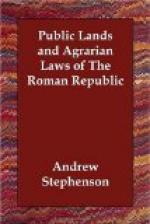Lines 24-25. Land besides this which remains public is not to be occupied, but to be left free to the public for grazing. A fine for occupation is imposed. The law allowed all persons to feed their beasts great and small on this public pasture, up to the number mentioned in lines 14-15 as the limit to be pastured on the ager campascuus, free of all tax. This, according to Rudorff, was done for the benefit of the small holders. Those who sent more than this number of animals to the public pastures must pay a scriptura, for each head.
Line 26. While the cattle or sheep were driven along the ‘calles,’ or beast-tracks, and along the public roads to the pasture grounds, no charge was made for what they consumed along the road.
Line 27. Land given in compensation out of public land, to be privatus utei quoi optuma lege.
Line 27. Land taken in this way from private ownership to be publicus, as in 133.
Lines 27-28. Land given in compensation for ager patritus to be itself patritus.
Line 28. Public roads to remain as before.
Line 29. Whatever Latins and peregrini might do in 112, and whatever is not forbidden citizens to do by this law, they may do henceforward.
Lines 29-30. Trial of a Latin to be the same as for a Roman citizen.
Lines 31-32. Territory (1) of borough towns or colonies (2), in trientabulis, to be, as before, public.
Lines 33-34. Cases of dispute about land made private between 133 and 111, or by this law, to be judged by the consul or praetor before next Ides of March.
Lines 35-36. Cases of dispute after this date to be tried by consuls, praetors, or censors.
Lines 36-39. Judgment on money owing to publicani to be given by consuls, proconsuls, praetors or propraetors.
Line 40. No one to be prejudiced by refusing to swear to laws contrary to this law.
Lines 41-42. No one to be prejudiced by refusing to obey laws contrary to this law.
Lines 43-44. On the colony of Sipontum (?).
Thus we see that the lex Thoria had two main objects in view: (1) The guaranteeing to possessors full property in the land which they occupied. (2) The freeing from vectigal or scriptura the property of every one.
In this way was the reaction of the aristocracy completed. It left nothing of the Sempronian law. Appian[31] has fully comprehended all this, and, in his enumeration of the three laws, connection between which he indicates, we see clearly the entire revolutionary system, conducted, we must admit, with a rare address and a perfidy which rendered the effect certain. The aristocracy did not rest. As soon as they had gained the people by their new bait of money and food, soothed them by their apparent generosity, and familiarized them with the idea that the possessions of the nobles




